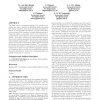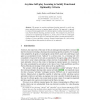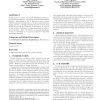849 search results - page 2 / 170 » Criteria of progress for information systems design theories |
ATAL
2011
Springer
12 years 5 months ago
2011
Springer
The main goal of a persuasion dialogue is to persuade, but agents may have a number of additional goals concerning the dialogue duration, how much and what information is shared o...
ALDT
2009
Springer
13 years 12 months ago
2009
Springer
We present an anytime multiagent learning approach to satisfy any given optimality criterion in repeated game self-play. Our approach is opposed to classical learning approaches fo...
HICSS
2010
IEEE
13 years 5 months ago
2010
IEEE
We present a new interface for exploring and navigating large-scale discussions on the internet. Our system, tldr, focuses on three primary user goals: finding, navigating and fil...
GECCO
2009
Springer
13 years 12 months ago
2009
Springer
The need for a stopping criterion in MOEA’s is a repeatedly mentioned matter in the domain of MOOP’s, even though it is usually left aside as secondary, while stopping criteri...
DESRIST
2009
Springer
13 years 10 months ago
2009
Springer
Design science is slowly but surely establishing itself as a recognized paradigm for conducting research in information systems. Researchers in the IS field have tried to study d...



